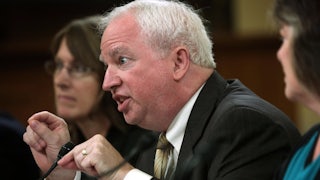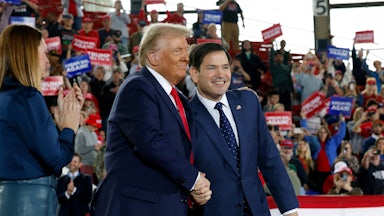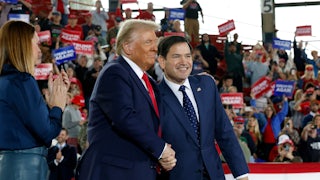From its inception, a persistent question hanging over the House select committee investigating the January 6 attack on the Capitol has been how far it would try to go and how successful it would be. The idea of the committee was for it to be bipartisan. Most Republicans hated that. The idea was for the committee to investigate the goings-on of Donald Trump and his allies throughout the day. Trump and his allies hated that. It wasn’t clear whether telecom companies would go along with a demand to hand over records. The committee made the demand anyway. And now, the committee’s latest dramatic moves make clear how aggressive it plans to be—and how hard Donald Trump will fight it.
“The committee is very quickly moving to narrow in on the most important question: Trump’s exact actions in and around January 6,” said Norm Eisen, who served as the co-counsel on the House Judiciary Committee during Trump’s first impeachment trial. “They’re hitting people from the White House chief of staff on down, in and outside of the White House, who have critical information.” He continued: “In Watergate, the question was what did the president know and when did he know it. Here, the question is what did the president do and when did he do it?”
Three recent moves have raised the stakes. First and most notably, on Thursday night, the committee issued its first round of subpoenas directed at four close associates of Donald Trump and prominent figures in his administration: former chief strategist Steve Bannon; former chief of staff Mark Meadows; former deputy chief of staff Dan Scavino; and Kash Patel, who was a chief of staff to acting Secretary of Defense Christopher C. Miller in the administration’s waning days. That same night, Democratic Representative Jamie Raskin, a committee member, told Rachel Maddow that more subpoenas would be on the way.
Second, the Biden White House is reportedly hewing toward handing over detailed information on the whereabouts of Trump and his aides on January 6 to Congress, a move that could trigger huge political and legal battles moving forward.
Third, and more quietly, earlier in the week, the panel announced it had brought on John Wood. This is interesting because Wood is a former lawyer for the U.S. Chamber of Commerce with impeccable conservative credentials. That’s on top of the committee bringing on former Representative Denver Riggleman, a Virginia Republican, as a top member of the committee’s staff.
Trump and his allies have loved to paint the committee as just another partisan witch hunt. Congressional Republicans largely went along, fighting the panel’s formation as a bipartisan group. But the committee’s most prominent staff hires aren’t snowflaky lawyers from the bleeding-heart liberal bastions of America. They’re conservative Republicans to the core with backgrounds in the Air Force (Riggleman) and as a clerk for one of the most conservative members of the Supreme Court (Wood). They can’t credibly be accused as fake Republicans. Whatever the committee concludes will be presented by Democrats and Republicans. Arguments that this probe was motivated by Democratic partisanship just won’t stick in the same way.
In answering the question above, Eisen said, “The committee is setting aggressive document production and deposition deadlines to give themselves plenty of runway if there is a court fight. Based on the precedents established in recent years, including in the [White House counsel Donald] McGahn case and the Mazars [accounting firm] one, the committee has the right to both witnesses and documents, and I think they will get them.”
The Select Committee on the January 6 attack has already been successful in its demand to 35 telecom and social media companies to preserve records of their communications the day of the Capitol attack. House Minority Leader Kevin McCarthy is on the list of the hundreds of people whose records the committee wants to preserve, something McCarthy has resisted.
Some of the committee’s steps insulate them from political pressures. Earlier this month, Congresswoman Liz Cheney, a member of one of the most prominent conservative families in the country, was elevated to vice chair of the committee (Cheney is also an outspoken critic of Trump). Congressman Adam Kinzinger, another Republican, joined the committee in the face of strong criticism from his party.
Wood’s Republican political bona fides are equally impeccable. Besides serving as general counsel of the Chamber of Commerce, Wood has been a chief of staff to the Department of Homeland Security under George W. Bush, clerked for Supreme Court Justice Clarence Thomas, worked at multiple august law firms, and held various posts at the Department of Justice. Former colleagues of Wood’s whom I interviewed gushed about him.
“He’s proudly a Republican. He worked in one or more Republican administrations in very responsible positions,” said former Missouri Senator Jack Danforth, for whom Wood worked as a legislative correspondent in the early 1990s. “He is a conservative, in the traditional sense and I think every sense.” Danforth, who served from the 1970s to the 1990s, was considered a conservative in his day, but things have changed considerably since then. His seat is held today by Josh Hawley. Of Wood, Danforth added that “he is very, very smart, and he’s also a really good person. I mean his character and manner, he’s a very, very good guy.”
Trump has become more openly hostile to the committee’s progress. He’s given it a Trumpian nickname—the “‘Unselect Committee’ of highly partisan politicians”—and has vowed to “fight the Subpoenas on Executive Privilege and other grounds, for the good of our Country, while we wait to find out whether or not Subpoenas will be sent out to Antifa and BLM for the death and destruction they have caused in tearing apart our Democrat-run cities throughout America.”
Raskin, a constitutional law professor, argued executive privilege doesn’t apply to former presidents. He told The Washington Post that “there’s no such thing as a former president’s executive privilege.”
Congressman Bennie Thompson, the chairman of the committee, conceded Friday that it’s possible Meadows or others who have been subpoenaed or will be subpoenaed would try to use executive privilege to dodge the committee.
“Basically, we’re trying to work and get the information, but you know there are provisions for individuals to object, and some might use those objections and others might not,” Thompson told reporters on Friday. “And so without trying to second guess any of them, we just get to our deadline, and the committee’s prepared to move forward and still proceed to get the information.”
Thompson refrained from offering any details on who else could be subpoenaed. “We have not, as a committee, decided the next people. There are a list of people, but I will just say those four subpoenas by no means will be the last subpoenas the committee issues,” Thompson explained. “But we want to be as forthright and deliberative. Some of the people, we’re going try to talk to them and see if they’ll come in voluntarily, and if they’ll come in voluntarily there’s no reason to issue a subpoena.”
Asked if Trump himself could be subpoenaed, Thompson said, “That’s to be discussed.”
Speed is an ongoing question hanging over the committee’s work. Members of the panel want to produce results before the midterm elections. “The schedule has always been a challenge to accomplish what we need to accomplish in the timeframe,” Congressman Pete Aguilar, a member of the select committee, told Politico.
That sentiment isn’t shared by some of Aguilar’s colleagues. At a breakfast hosted by The Christian Science Monitor earlier this week, Congressman Adam Schiff, the chairman of the House Intelligence Committee, said he isn’t concerned with the pace of the investigation. Rather, he is concerned with bringing people forward to testify.
It’s understandable that top Democrats would be less concerned with the speed of the investigation and more with bringing relevant parties forward to hand over information and testify. After all, details about efforts by the president and his allies to undermine the 2020 election keep coming out. It’s clear that the probe’s foes can’t stop that, but it’s almost equally inevitable that they will do everything they can to undermine it.
Grace Segers contributed reporting for this
piece.







